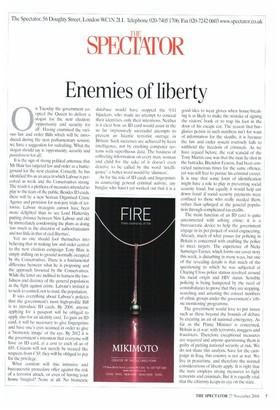Enemies of liberty
Qn Tuesday the government coopted the Queen to deliver a slogan for the next election: 'opportunity and security for all'. Having examined the various law and order Bills which will be introduced during the next parliamentary session, we have a suggestion for redrafting. What the slogan should say is 'opportunity, security and punishment for all'.
It is the sign of strong political antennae that Mr Blair has targeted law and order as a battleground for the next election. Correctly, he has identified this as an area in which Labour is perceived as weak and the Conservatives strong. The result is a plethora of measures intended to play to the fears of the public. Besides ID cards, there will be a new Serious Organised Crime Agency and provision for non-jury trials of terrorists. Labour strategists cannot have been more delighted than to see Lord Hattersley putting distance between New Labour and old by immediately condemning the plans as doing 'too much in the direction of authoritarianism and too little in that of civil liberties'.
Yet no one should IOU' themselves into believing that in making law and order central to the next election campaign Tony Blair is simply shifting on to ground normally occupied by the Conservatives. There is a fundamental difference between what he is proposing and the approach favoured by the Conservatives. While the latter are inclined to harness the lawfulness and decency of the general population in the fight against crime. Labour's instinct is to seek to control, not to trust, the population.
It says everything about Labour's policies that the government's most high-profile Bill is to introduce ID cards. By 2008, anyone applying for a passport will be obliged to apply also for an identity card. To gain an Ill card, it will be necessary to give fingerprints and have one's eyes scanned in order to give a `bionetric image of the eye. By 2012 it is the government's intention that everyone will have an ID card, at a cost to each of us of £85. Citizens will not merely he treated like suspects from C.5.f; they will be obliged to pay for the privilege.
What comfort will this intrusive and bureaucratic procedure offer against the risk of a terrorist attack, or even of having your house burgled? None at all. No biometric database would have stopped the 9111 hijackers. who made no attempt to conceal their identities, only their intentions. Neither is it clear how an ID card would assist in the so far impressively successful attempts to prevent an Islamic terrorist outrage in Britain. Such successes are achieved by keen intelligence, not by crashing computer systems with superfluous data. The business of collecting information on every man, woman and child for the sake of it doesn't even deserve to be called by the word 'intelligence': a better word would be 'dimness'.
As for the role of ID cards and fingerprints in countering general criminal activity, any burglar who hasn't yet worked out that it is a good idea to wear gloves when house-breaking is as likely to make the mistake of signing the visitors' book or to trap his foot in the door of his escape car. The reason that burglaries persist in such numbers isn't for want of information for the sleuths; it is because the law and order system routinely fails to withhold the freedom of criminals. As we have argued before, the real scandal of the Tony Martin case was that the man he shot in the buttocks, Brendon Fearon, had been convicted numerous times for the same offence, yet was still free to pursue his criminal career. It is true that some form of identification might have a role to play in preventing social security fraud, but equally it would help cut down fraud if social security payments were confined to those who really needed them, rather than splurged at the general population through complicated tax credits.
The main function of an ID card is quite unconnected with solving crime: it is a bureaucratic device to help the government engage in its pet project of social engineering. Already, much of what passes for policing in Britain is concerned with enabling the police to meet targets. The experience of Nicky Samengo-Turner, which tOrms our cover story this week, is disturbing in many ways, but one of the revealing details is that much of the questioning to which he was subjected at Charing Cross police station revolved around his racial origin and IIIV status. Sensible policing is being hampered by the need of constabularies to prove that they are stopping, searching and arresting the correct numbers of ethnic groups under the government's 'ethnic monitoring' programme.
The government would love to put issues such as these beyond the bounds of debate by creating an air of national emergency. As far as the Prime Minister is concerned, Britain is at war: with terrorists, muggers and fraudsters. Therefore exceptional measures are required and anyone questioning them is guilty of putting national security at risk. We do not share this analysis. Save for the campaign in Iraq, this country is not at war. We live in peacetime, and therefore the normal considerations of liberty apply. It is right that the state employs strong measures to fight terrorists and criminals. But it is equally vital that the citizenry keeps its eye on the state.


















































































 Previous page
Previous page